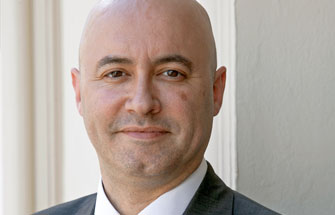Philippe Guignard has managed the Monaco branch of Crédit Agricole since 2008. He shares with us his thoughts on the evolution of the financial centre, as well as his branch.
How have you seen the Monaco financial centre evolve in eight years?
Monaco’s image has changed and major communications efforts have been made for the financial centre. It is an economic financial centre with a viable and sound economic system. One outcome of this new image is the financial transparency initiated by the banks. This is continuing with Monaco’s commitments to join in the international exchange of financial information. Monaco’s territory is expanding, the model is changing, and new opportunities are emerging.
How is Crédit Agricole Monaco evolving?
Historically, the Caisse Régionale set up in Monaco in 1990 to carry out private banking. From now on, we are turning a corner – to become consistent with Crédit Agricole’s local mission. This means supporting Monaco in its economic development in the different worlds of private individuals, companies and institutional investors.
October’s recent creation of a business centre for companies has led to the intensification of our relationships with a number of local economic players. To our offering, initially focused on asset allocation, we have added property loans, business loans and all the support this market requires. The business model of the branch, focused on managing private customers and investment advice, has evolved significantly to be more complete.
Does Crédit Agricole know this business well?
We are the leading business financing group in France. Having a financial economic player able to bring borrowing capacity and support expertise locally can be a plus for Monaco.
Companies in Monaco often have several bank accounts. Diversified banking players provide supply stability and the risk-sharing capacity to support major development.
Becoming an economic player that supports the entrepreneurial powers should enable us to access greater visibility with businesses, but also with private individuals by financing their private assets.
How are you now structured to turn this corner?
We have recruited new staff, trained in-house to be company business managers. We are in the initial phase. We are picking up the relationships the Caisse Régionale already had with Monegasque companies, from the Saint-Laurent du Var branch, and setting up work priorities with them. Other companies have come to meet us spontaneously or through indirect contacts. We have also held meetings with business leaders with whom we were in private contact.
We are moving forward steadily and above all striving, necessarily, for quality.
The concept of being close to companies is dear to Crédit Agricole.
It only makes sense if it allows us to have a good understanding of companies, guarantee them optimum day to day operating and support them in their development projects.
The latter two give rise to either financial problems or commercial transaction security problems. We are the partners of business leaders, their new needs give rise to new solutions, and we can have a truly educational role in the mastery of companies’ development.
Is this an important corner to turn for your team?
It has experienced this development in the company market very positively, as an intensification of our bank’s value locally. Developing relationships with Monaco residents is a vehicle of opportunity in the private area, to expand our range of services, including property financing. The changes in the Monaco financial centre have made diversified banking models make sense.
The evolution of the banks’ business model is much talked about.
The importance of compliance poses the question of the critical size of being based in Monaco, of course. Our dedicated team is in place: 10% of the workforce. Developments such as FATCA (Foreign Account Tax Compliance Act), CRS (Common Reporting Standard), OECD, and anti-money-laundering needs, have led banks to be equipped and to automate. One key challenge for banks now is their information system, that needs to roll out the compliance system. The operational process needs to be a compliance generator, as there can be no non-compliant development because all activities are regulated.
Does everything that can be automated need to be automated?
I believe so. The change that the Monaco financial centre has undergone will create an evolution in customer expectations. Successive generations are making greater use of new technology, and what about the hyper-connected generations of the future? Banks are evolving greatly. If the online model does not kill the previous one, requests concerning access to information, or even a certain type of advice, are clearly not the same. International private banking issues will likely change. The information system is at the heart of the issue. But personal relationships cannot be done away with, they are even becoming essential. The bank must stay closely in touch with its customers.






